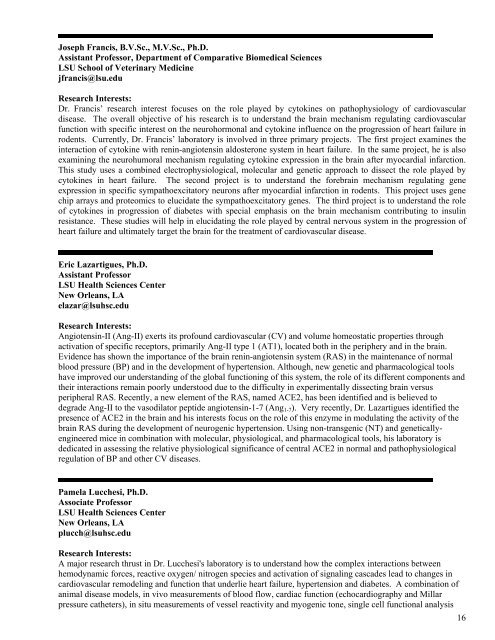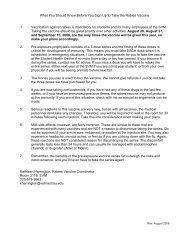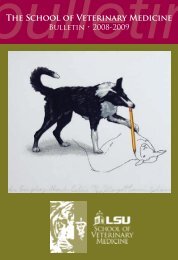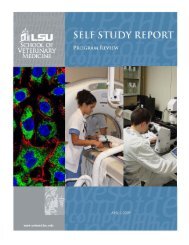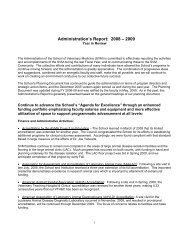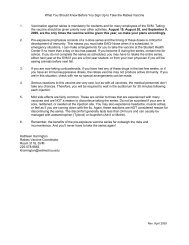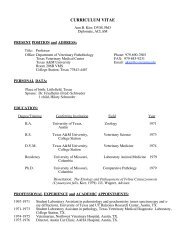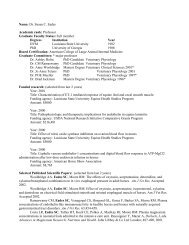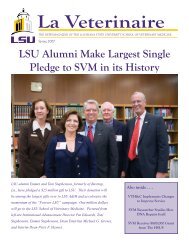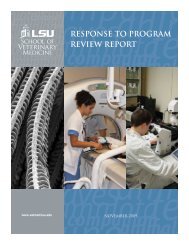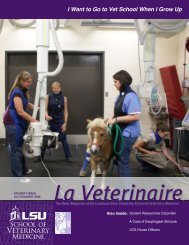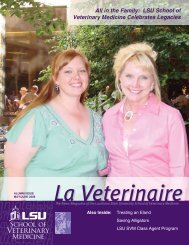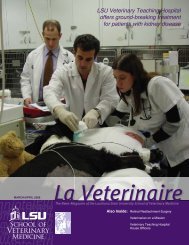2006 merck/merial - School of Veterinary Medicine - Louisiana State ...
2006 merck/merial - School of Veterinary Medicine - Louisiana State ...
2006 merck/merial - School of Veterinary Medicine - Louisiana State ...
You also want an ePaper? Increase the reach of your titles
YUMPU automatically turns print PDFs into web optimized ePapers that Google loves.
Joseph Francis, B.V.Sc., M.V.Sc., Ph.D.Assistant Pr<strong>of</strong>essor, Department <strong>of</strong> Comparative Biomedical SciencesLSU <strong>School</strong> <strong>of</strong> <strong>Veterinary</strong> <strong>Medicine</strong>jfrancis@lsu.eduResearch Interests:Dr. Francis’ research interest focuses on the role played by cytokines on pathophysiology <strong>of</strong> cardiovasculardisease. The overall objective <strong>of</strong> his research is to understand the brain mechanism regulating cardiovascularfunction with specific interest on the neurohormonal and cytokine influence on the progression <strong>of</strong> heart failure inrodents. Currently, Dr. Francis’ laboratory is involved in three primary projects. The first project examines theinteraction <strong>of</strong> cytokine with renin-angiotensin aldosterone system in heart failure. In the same project, he is alsoexamining the neurohumoral mechanism regulating cytokine expression in the brain after myocardial infarction.This study uses a combined electrophysiological, molecular and genetic approach to dissect the role played bycytokines in heart failure. The second project is to understand the forebrain mechanism regulating geneexpression in specific sympathoexcitatory neurons after myocardial infarction in rodents. This project uses genechip arrays and proteomics to elucidate the sympathoexcitatory genes. The third project is to understand the role<strong>of</strong> cytokines in progression <strong>of</strong> diabetes with special emphasis on the brain mechanism contributing to insulinresistance. These studies will help in elucidating the role played by central nervous system in the progression <strong>of</strong>heart failure and ultimately target the brain for the treatment <strong>of</strong> cardiovascular disease.Eric Lazartigues, Ph.D.Assistant Pr<strong>of</strong>essorLSU Health Sciences CenterNew Orleans, LAelazar@lsuhsc.eduResearch Interests:Angiotensin-II (Ang-II) exerts its pr<strong>of</strong>ound cardiovascular (CV) and volume homeostatic properties throughactivation <strong>of</strong> specific receptors, primarily Ang-II type 1 (AT1), located both in the periphery and in the brain.Evidence has shown the importance <strong>of</strong> the brain renin-angiotensin system (RAS) in the maintenance <strong>of</strong> normalblood pressure (BP) and in the development <strong>of</strong> hypertension. Although, new genetic and pharmacological toolshave improved our understanding <strong>of</strong> the global functioning <strong>of</strong> this system, the role <strong>of</strong> its different components andtheir interactions remain poorly understood due to the difficulty in experimentally dissecting brain versusperipheral RAS. Recently, a new element <strong>of</strong> the RAS, named ACE2, has been identified and is believed todegrade Ang-II to the vasodilator peptide angiotensin-1-7 (Ang 1-7 ). Very recently, Dr. Lazartigues identified thepresence <strong>of</strong> ACE2 in the brain and his interests focus on the role <strong>of</strong> this enzyme in modulating the activity <strong>of</strong> thebrain RAS during the development <strong>of</strong> neurogenic hypertension. Using non-transgenic (NT) and geneticallyengineeredmice in combination with molecular, physiological, and pharmacological tools, his laboratory isdedicated in assessing the relative physiological significance <strong>of</strong> central ACE2 in normal and pathophysiologicalregulation <strong>of</strong> BP and other CV diseases.Pamela Lucchesi, Ph.D.Associate Pr<strong>of</strong>essorLSU Health Sciences CenterNew Orleans, LAplucch@lsuhsc.eduResearch Interests:A major research thrust in Dr. Lucchesi's laboratory is to understand how the complex interactions betweenhemodynamic forces, reactive oxygen/ nitrogen species and activation <strong>of</strong> signaling cascades lead to changes incardiovascular remodeling and function that underlie heart failure, hypertension and diabetes. A combination <strong>of</strong>animal disease models, in vivo measurements <strong>of</strong> blood flow, cardiac function (echocardiography and Millarpressure catheters), in situ measurements <strong>of</strong> vessel reactivity and myogenic tone, single cell functional analysis16


